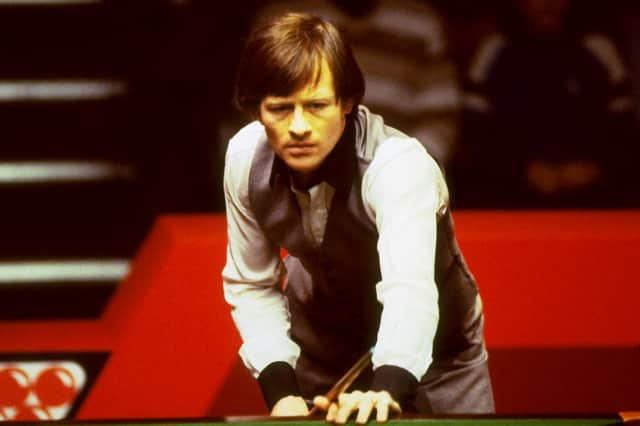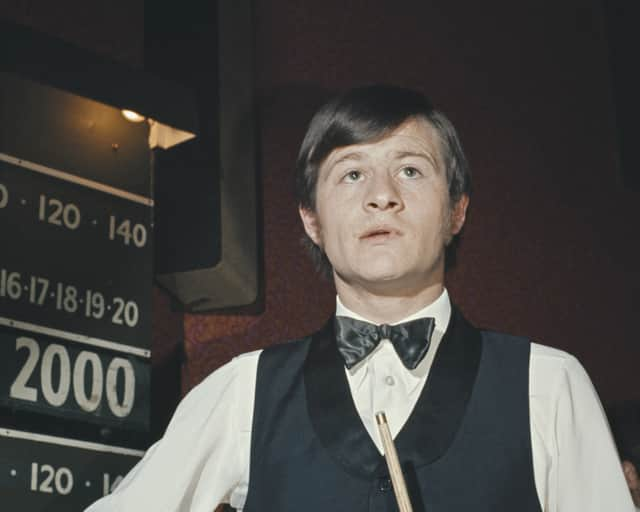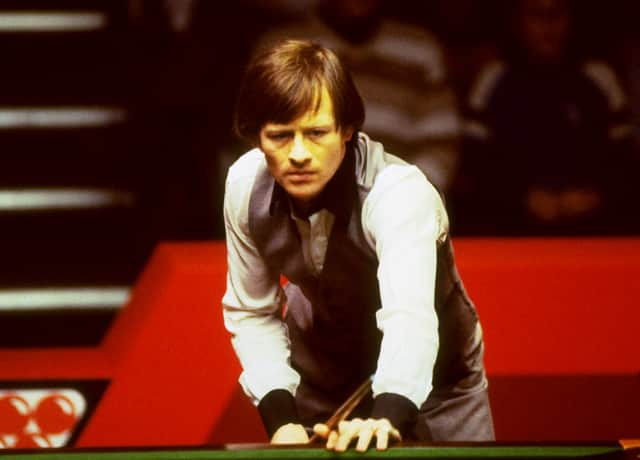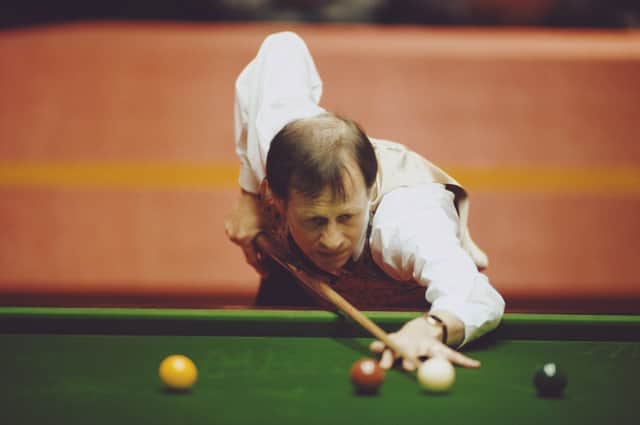Alex Higgins’ Final Crucible Appearance, 30 Years On


Following a turbulent and violent exit from the 1990 installment, Higgins was banned from the professional game for several months and consequently tumbled down the rankings, although he did manage one final Sheffield hoorah in 1994.
Ranked 61st in the world, a 44-year-old Higgins won three qualifying matches to reach the Crucible once again. In an all-Irish opening round tie against Ken Doherty, Higgins showed glimpses of magic, but lost 10-6.
Advertisement
Advertisement
Higgins attempted to re-qualify in the following years but failed to win a match.
To mark the three decades since he last walked down the Crucible steps for the sport’s blue-riband event, we look back at The Hurricane’s World Championship record.


Alex Higgins’ Pre-Crucible World Championship Record
Alex Higgins won the World Snooker Championship at his first attempt in 1972.
A tournament that took nearly a year to complete, Higgins won six matches en route to the title, including two qualifying rounds. He ousted Rex Williams 31-30 in the semi-finals and then dethroned reigning champion John Spencer 37-31 in the final held at the Selly Park British Legion in Birmingham.
Advertisement
Advertisement
Higgins made history on two counts; the first qualifier to lift the trophy, and the youngest-ever champion at the age of 22. This record remained until a 21-year-old Stephen Hendry triumphed in 1990.
Media interest and coverage in Higgins and the sport began to increase following his maiden coronation.
The World Snooker Championship format changed from 1973 onwards resulting in the event being condensed and completed in a matter of a few weeks. Defending the title for the first time, Higgins lost in the last four to Eddie Charlton.
A second world final appearance arrived for Higgins in 1976 - the final year before the tournament moved to the Crucible Theatre in Sheffield - but he was denied by Ray Reardon who claimed his fifth world crown and fourth in as many years.
Alex Higgins’ Crucible Record
Advertisement
Advertisement
Life at the new world championship venue did not start well for Higgins as he lost deciding frame opening round encounters in both 1977 and 1978. He picked up his first win there in 1979 when he defeated David Taylor 13-5 but was dismissed in the next round (quarter-finals) by eventual champion Terry Griffiths, 13-12. Griffiths went on to emulate Higgins by winning the title at his first attempt, and as a qualifier.
Higgins said that 1980 would be ‘the year of The Hurricane’. He very nearly delivered on that proclamation, reaching his third world final where he faced Cliff Thorburn. In control of the title match at 9-5 up, though, Higgins began to lose discipline with his shot selection. Thorburn was far too good to allow your guard to slip against, and the Canadian turned things around in the contest and later completed an 18-16 win.
A 13-8 opening match defeat to Steve Davis in 1981 sent Higgins back to Crucible square one. Meanwhile, Davis advanced to collect the first of his six world titles that decade.
The Northern Irishman’s finest career moment came in the fabled 1982 edition. Higgins dispatched Jim Meadowcroft (10-5), Doug Mountjoy (13-12) and Willie Thorne (13-10) to make the semi-finals where he denied a young Jimmy White 16-15, having been two down with three to play. This recovery included the showstopping 69 counter clearance in frame 30, an effort that effectively saved his tournament life.


Advertisement
Advertisement
Against six-time champion Reardon in the final, Higgins managed to stay level-headed, breaking free from 15 all in the closing stages to record a memorable 18-15 success, finishing in style with a 135 total clearance.
An emotional ‘People’s Champion’ shared his second world crowning on the Crucible floor with his baby daughter, Lauren, in one of sport’s most iconic and human scenes.
The Crucible Curse struck in 1983 as Higgins relinquished his title to Davis 16-5 in the last four. Davis continued in Sheffield and reclaimed the title.
That would be the final time that Higgins graced the one-table set-up at the Crucible in the event. He was pipped 10-9 by debutant Neil Foulds in round one in 1984 before three successive last 16 exits to Griffiths.
Advertisement
Advertisement
In 1988, Higgins was defeated 10-2 by qualifier Tony Drago at the first hurdle, a result that pushed him outside the world’s top 16 for the first time since the rankings were created in the mid 1970s. He never returned to the sport’s elite bracket.
Now needing to qualify for the Crucible stages, he missed out on the main draw for the first time when he lost to Darren Morgan in the preliminaries in 1989, but he did return to the hallowed carpet in 1990.
At the venue, though, Higgins lost to Steve James 10-5 in the opening round. Long after his defeat, Higgins remained sat in his chair in the arena, cutting a dejected figure as he tried to wash away the taste of defeat by downing copious amounts of vodka and orange.
Out of control, Higgins eventually made his way backstage and onto a collision course. Surreal scenes ensued, as he punched a tournament official in the gut in an unprovoked attack before launching a sad, slurred rant in the press conference area where he described how he was fed up with the game, the authorities, and was going to retire. Premeditated or spontaneous, either way, Higgins knew there would be serious ramifications for his violent conduct just a few moments earlier; the latest outburst in what had already been a tumultuous season.
Advertisement
Advertisement
Banned for a year and fined £5,000, Higgins returned to the sport but due to his absence he had plummeted down the world rankings ladder and now needed to win multiple matches to reach main venues, including the Crucible.
Qualifying was unsuccessful in 1992 and 1993, but against the odds, Higgins navigated three matches at the 1994 preliminaries to claim a spot in the 32-player Crucible draw, for what would be the final time. During his final qualifying round match with Tony Knowles in Blackpool, Higgins recovered from a 6-3 deficit – and a cut he sustained on his arm when he fell returning to the venue – to win 10-9 and secure a romantic return.


In Sheffield, Higgins met number 11 seed Ken Doherty in an all-Irish opening round fixture. Higgins fell 4-0 behind but he did show resistance – taking frame five when he was 63 points behind – in the encounter, although he was eventually eliminated 10-6. A respectable score against a player who was world champion just three years later.
Higgins featured in world championship qualifying for the next three years but failed to win a match. However, he did produce a break of 137 – his highest in the event – at the 1995 qualifiers against Thailand’s Tai Pichit. He was entered for the 1998 and 2003 campaigns, but both his opponents received walkovers.
Advertisement
Advertisement
In 2010, Higgins performed at the Crucible Theatre one last time, alongside Thorburn, John Parrott and close friend White for a one-night Snooker Legends exhibition, although fans will much prefer to remember The Hurricane’s glory days of the early 1980s when he was one of sport’s genuine superstars.
